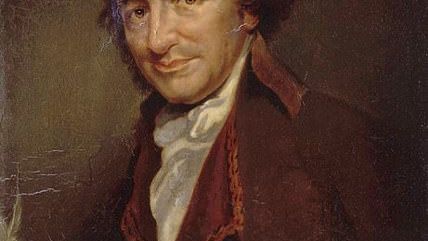Modern Political Debate Follows a 200-Year Tradition
The argument between Thomas Paine and Edmund Burke never went away.

What sound like fights between capitalism and socialism or between "religious traditionalism and secular cosmopolitanism," turn out to be battles between "progressive liberalism" and "conservative liberalism," echoes of the more than 200-year-old dispute between Thomas Paine and Edmund Burke.
That's the argument of Yuval Levin, whose The Great Debate: Edmund Burke, Thomas Paine, and the Birth of Right and Left is published this week by Basic Books. Mr. Levin, the editor of the journal National Affairs and a former aide to both House Speaker Newt Gingrich and President George W. Bush, provides a valuable service by dusting off the writings of Burke and Paine and by clearly, concisely, and accessibly summarizing them in a way that highlights their relevance to contemporary politics and policy.
Burke, a member of the British House of Commons, was, by Mr. Levin's telling, a gradualist reformer, a "forward-looking traditionalist" wary of the dangers of unchecked democracy, conscious of the ignorance and fallibility of mankind, and respectful of obligations to family and nation.
Paine, a pamphleteer influential in the American Revolution, was, by Mr. Levin's account, a utopian who emphasized free choice and the consent of the governed, opposed monarchy, was skeptical of religion, had confidence in new structures based on reason, and was impatient in confronting injustice.
Part of why both men are still remembered is their skill as writers. Mr. Levin provides enough quotations and excerpts for readers to understand why.
Paine is known not only for his "Common Sense," which helped launch the American Revolution, but also for "The American Crisis:" "These are the times that try men's souls."
Burke's "Reflections on the Revolution in France" and his other writings also includes some keepers: "What is liberty without wisdom, and without virtue? It is the greatest of all possible evils; for it is folly, vice, and madness…" And also: "The idea of forcing every thing to an artificial equality has something, at first view, very captivating in it." However, "Those who attempt to level never equalize" — the very attempt is a "monstrous fiction, which by inspiring false ideas and vain expectations into men destined to travel in the obscure walk of laborious life serves only to aggravate and embitter that real inequality."
Mr. Levin acknowledges that, 200 years later, America's right-left arguments don't always map so neatly onto the Burke-Paine diagram. I found myself recognizing the libertarian hero Milton Friedman of "Free To Choose" fame in Mr. Levin's description of Paine's emphasis on the individual and choice. Levin refers once to "the often communitarian Burke" and "the often libertarian Paine," which makes some mischief with the book's subtitle's case that Burke is the father of the right and Paine is the father of the left.
Today's left, Mr. Levin writes, "could learn from Paine's insistence on limits to the use of power and the role of government." Today's conservatives, in Mr. Levin's view, are "far too open to the siren song of hyperindividualism," and "could benefit by adopting Burke's focus on the social character of man."
Mr. Levin, clearly an admirer of Burke, makes the case that he was not "merely a defender of the established order" but also "a leader in almost every reform effort," who favored moderating excessive punishments in British criminal law, ending the slave trade, and making British law more friendly to dissenters from the Church of England.
Yet Mr. Levin doesn't flinch from recording some of Burke's more abject fawning on the British nobility, including a 1772 letter from Burke to the Duke of Richmond: "You people of great families and hereditary trusts and fortunes are not like such as I am, who, whatever may be the rapidity of our growth, and even by the fruit we bear, and flatter ourselves a little that, while we creep on the ground, we belly into melons that are exquisite for size and flavor, yet still we are but annual plants that perish with our season, and leave no sort of traces behind us. You, if you are what you ought to be, are in my eye the great oaks that shade a country, and perpetuate your benefits from generation to generation."
One reason Burke gets traction among American conservatives is for his supposed support of the American Revolution. Burke was more sympathetic to the complaints of the colonists than many other members of Parliament. Yet I write in my biography of Samuel Adams, Burke spoke out in Parliament in favor of targeting the Revolutionary ringleaders. "The persons guilty were Mr. Hancock and Mr. Samuel Adams," Burke said on March 25, 1774 during the debate on the Boston Port Bill. "Punish Hancock, Adams, and others you know, but not all." Later, in Burke's 1777 "Letter to the Sheriffs of Bristol," he wrote, "I am charged with being an American. If warm affection towards those over whom I claim any share of authority be a crime, I am guilty of this charge. But I do assure you (and those who know me publicly and privately will bear witness to me,) that if ever one man lived more zealous than another for the supremacy of parliament, and the rights of this imperial crown, it was myself."
The monarchist Burke and the religious skeptic Paine, an early supporter of the bloody French revolution, would seem to be unlikely models for today's American politicians of either party. But Mr. Levin has made a convincing case that, 200 years later, we can still learn from both men.


Show Comments (107)